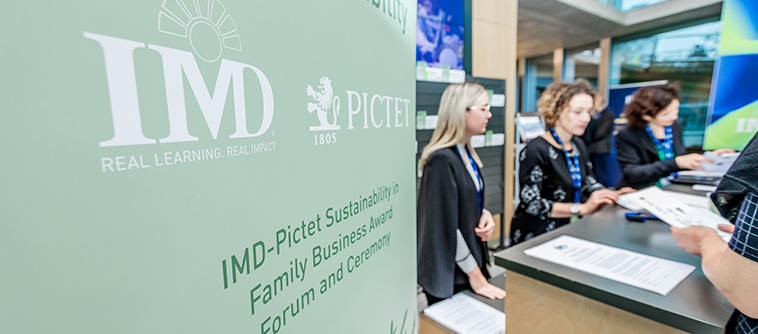There is a new type of awareness among business leaders that sustainability should be embedded into the values, strategy and purpose of a company.
“Leaders are asking themselves a new, crucial question,” said IMD Professor of Leadership and Negotiation Sameh Abadir. “What kind of contribution can I make to the future?”
“Leaders today should not only think about their careers but also their contributions, both to business and to society – contribution that is unique, durable and measurable – combining business performance and societal progress.”
Abadir was speaking during the Family Business: A Voice for Change in Sustainability Forum, a learning-focused event discussing the scope, breadth and depth of sustainability in family businesses.
During the forum, the inaugural IMD-Pictet Sustainability in Family Business Award was presented to Firmenich, the world’s largest privately held perfume and taste company, for its outstanding efforts to embed responsible practices and purpose throughout its operations.
“Firmenich’s sustainability credentials are exemplary and have been applauded by the judging panel as the company is actively delivering on its ambitious sustainability goals,” said Rémy Best, managing partner of the Pictet Group.
Green sweet spot
Speaking ahead of the award announcement, Barbara Kux, Vice-Chairman and member of the board of Firmenich, Henkel, Grosvenor Group and Pargesa Holding said that companies should look to synchronise the ‘three Ps’: profit, people and the planet. Profit and people have always been important, but the planet is a more recent addition, she said.
Whenever leaders make a strategic decision, hire someone or make an acquisition, they should have these three things in mind.
It is important that sustainability is embedded in a company’s values, Kux added, and this is typical of family businesses. But you need to find a “green sweet spot” where your company can focus its efforts.
Core values
What is Firmenich’s formula for success in this area?
Gilbert Ghostine, the company’s first non-family CEO, said sustainability is one of the company’s fundamental values. The company has embedded sustainability in its core business, corporate governance and its wider ecosystem with clients, suppliers, foundations, NGOs, and academic institutions.
The company is leveraging science to tackle some of the biggest issues of the day, he said. Its TastePRINT™ product can naturally reduce up to 100% of added sugar in products. Its Smart Protein solution, meanwhile, is making plant-based proteins which will help to reduce global consumption of animal protein.
Firmenich has also partnered with the Bill & Melinda Gates Foundation to develop technologies to increase access to safe toilets for about 4.5 billion people. The company is a founding member of the Toilet Board Coalition (TBC), a business-led public-private partnership, launched in 2014, which connects large and small companies to accelerate the business of sanitation and achieve universal access to sanitation before 2030.
“I strongly believe leadership in the 21st century needs a combination of skills,” Ghostine said. “It is not just about driving performance and transforming your business, but doing it with purpose.”
Performance matters, Ghostine said, and businesses need to keep reinventing their business model and thinking about the next generations. But more important is purpose, ethics, values, and sustainability. “This is why these three pillars have equal weight in our organisation. “Today, you make a stand and then you figure out how to get there.”
Firmenich, which was founded in Switzerland in 1895, is fully owned by about 40 family shareholders and is active in more than 100 countries.
Marie-Christine Jaeger-Firmenich, Vice-President, Family Board, Firmenich, said the spirit of the Firmenich family could be defined as having “sustainability in our DNA.”
“We have a responsibility to pass on what we have inherited,” she added.
Finding purpose
Businesses today are increasingly blending business and social values, said Alexis du Roy de Blicquy, CEO of the Family Business Network. Traditional businesses were once primarily focused on their bottom line, while charities and NGOs were separate entities to address societal challenges.
Today, businesses want to marry the two, minimizing their harmful impacts and becoming purpose driven, using business as a force for good and using business tools to address societal challenges.
Closing the forum, IMD President Jean-François Manzoni, said: “At IMD we are relatively convinced that in the future it will not only be possible to do well by doing good, it will only be possible to do well by doing good.”

